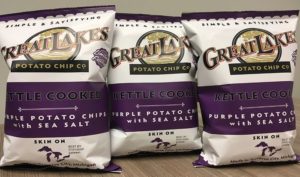Great Lakes Potato Chips uses purple potato to create hit product
Nearly three years ago, Great Lakes Potato Chip Co. owner Chris Girrbach ran into potato breeder David Douches at an event where the latter was showcasing his work.
One of the new varieties Douches — the director of Michigan State University’s Potato Breeding and Genetics Program — had on display caught Girrbach’s eye.
Blackberry, a round tuber with unique deep purple skin and flesh.
“I thought, what a cool item,” Girrbach said. “We could do something fun with that.”
Girrbach’s “fun” idea finally came to fruition recently, as his Michigan-based chip company debuted its Blackberry chips with an initial run of 4,500 bags. Girrbach thought it was a good idea, but was still a little surprised at how quickly the first batch sold out.
Great Lakes Chips’ retail customers are located primarily in Michigan, with a small percentage in neighboring states. “There might be a few retailers with a case left or something, but they’re pretty much gone,” Girrbach said.
The process

Girrbach approached Iott Seed Farms, which is located less than an hour’s drive from Great Lakes Potato Chip’s Traverse City production facility. Dennis and Greg Iott agreed to grow a small plot of Blackberry potatoes for a trial run.
“That first run was about a year and a half ago,” Girrbach said. “They fried up really nice, so we said, ‘let’s do it.’” This year, the Iotts grew 20,000 pounds of Blackberrys just for Great Lakes Chips.
Girrbach said the purple tubers process and fry like any other chipping potato.
“I thought the purple potatoes would stain the oil and we’d have to get rid of it, but they didn’t do anything like that,” Girrbach said. “The time, temperature and structure were all the same (as other potatoes).
“The slicer does get a little purple, so there is a little extra work in terms of cleanup and sanitation.”
Future plans
Great Lakes used 6,000 pounds during the first run. Girrbach said they’ll fry and distribute the rest after the first of the year.
The good reception of the chips has Girrbach leaning toward doing them on an annual basis, although probably not making them a regular item, mostly because of additional storage requirements.
“After the holidays are over, we’re going to see about planting again for next year,” he said. “Hopefully, it’ll be a year-after-year thing.”
Girrbach said the moderate size of his company actually worked to its advantage in terms of doing something a little unusual.
“The way our production lines are set up, we are probably a little more nimble than some of the larger chip companies,” he said.
“I am really excited we were the first ones to make a chip out of this variety, especially since it’s a Michigan State potato and grown by a Michigan farmer.”
— By Zeke Jennings, managing editor







